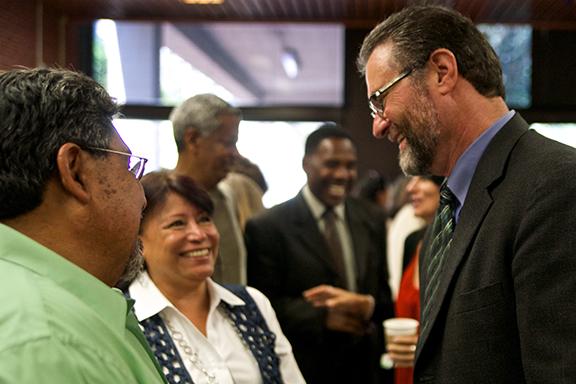Beebe on a mission to promote social justice

San Diego City College President Anthony Beebe greets teachers and staff at an Aug. 4 mixer. Photo credit: Troy Orem
October 14, 2014
San Diego City College’s new president, Anthony Beebe, is pursuing a new mission for the campus.
“City College needs to develop new, modern definitions and approaches to civil, nonviolent, respectful, and peaceful engagement. … This will empower students to tackle the most difficult social issues of our time as they leave City College,” Beebe said in an edition of his newsletter to faculty and staff.
In a follow-up interview, Beebe expanded on these social topics, starting with his definitions of social justice and civility.
“For me,” Beebe opened, “social justice is about the distribution of wealth, opportunity, and privilege in society and education is a key to being able to have an opportunity of wealth, to have an opportunity of privilege and so I think that to me is kind of an overall definition of social justice.”
Beebe continued, “I’m defining civility in terms of how we in society treat each other. You see a degradation in the respect that we give one another anymore in the community. I think we’re better than that.”
Faculty, staff and students also have an understanding of social justice and civility.
“It’s just understanding that we have cultural differences here on campus and that can be a good thing and being tolerant and aware of that and using those ideas in class to further the conversation so to make sure that we’re aware of different learning challenges that might be available, being tolerant and patient with our students and presenting the ideas in a way that more than one type of student would be able to benefit from,” Accounting Professor Shana Carr said.
When asked if she thought civility was beneficial to social justice, Carr stated, “Absolutely, absolutely. it’s an important thing that we do here.”
Business Management student Twyla LaFond was expansive on the topic of social justice.
“It’s always going to be a challenge. It’s never going to be perfect, You’re dealing with imperfect people that come from imperfect places. Everybody sees things differently, everybody sees life differently,” said LaFond.
Learning about social justice and civility is the next step, according to Beebe.
Beebe says faculty have been responsive and engaged in this effort. Instructors in subjects outside of humanities, such as physical and life sciences, are challenged to see how their disciplines align with social justice and civility.
“For those of us that are not in humanities subjects, we have options to help us become more culturally aware and tolerant of different backgrounds,” said Carr.
One of those options is through professional development courses at San Diego State University. Usually one course is offered each semester.
Carr explained that this semester there were two courses, one of which is called “Teachers as Cultural Workers: Those That Dare to Teach Social Justice.” The course came at the perfect time.










zcin • Oct 24, 2014 at 10:01 pm
“For me,” Beebe opened, “social justice is about the distribution of wealth, opportunity, and privilege in society and education is a key to being able to have an opportunity of wealth, to have an opportunity of privilege and so I think that to me is kind of an overall definition of social justice.”
Beebe continued, “I’m defining civility in terms of how we in society treat each other. You see a degradation in the respect that we give one another anymore in the community. I think we’re better than that.”
You, sir, are a joke. Quit.
dekko • Oct 15, 2014 at 4:19 am
Does anyone notice any of this? “Teachers as Cultural Workers: Those That Dare to Teach Social Justice.” You’ve got to be kidding me, that’s the last thing they do, unless racial studies/diversity classes are forced into the curriculum
And, actually, as long as there’s race classes in school, racial differences will still be noticed and foisted upon both students and older citizens in the workforce. Your culture becomes what it’s taught.
“For those of us that are not in humanities subjects, we have options to help us become more culturally aware and tolerant of different backgrounds,” said Carr. You can’t be serious, and this from Carr. Sure it wasn’t Boyd?
It just gets deeper and deeper for this ghetto school. Hey, don’t get mad, it’s just what I was taught there.